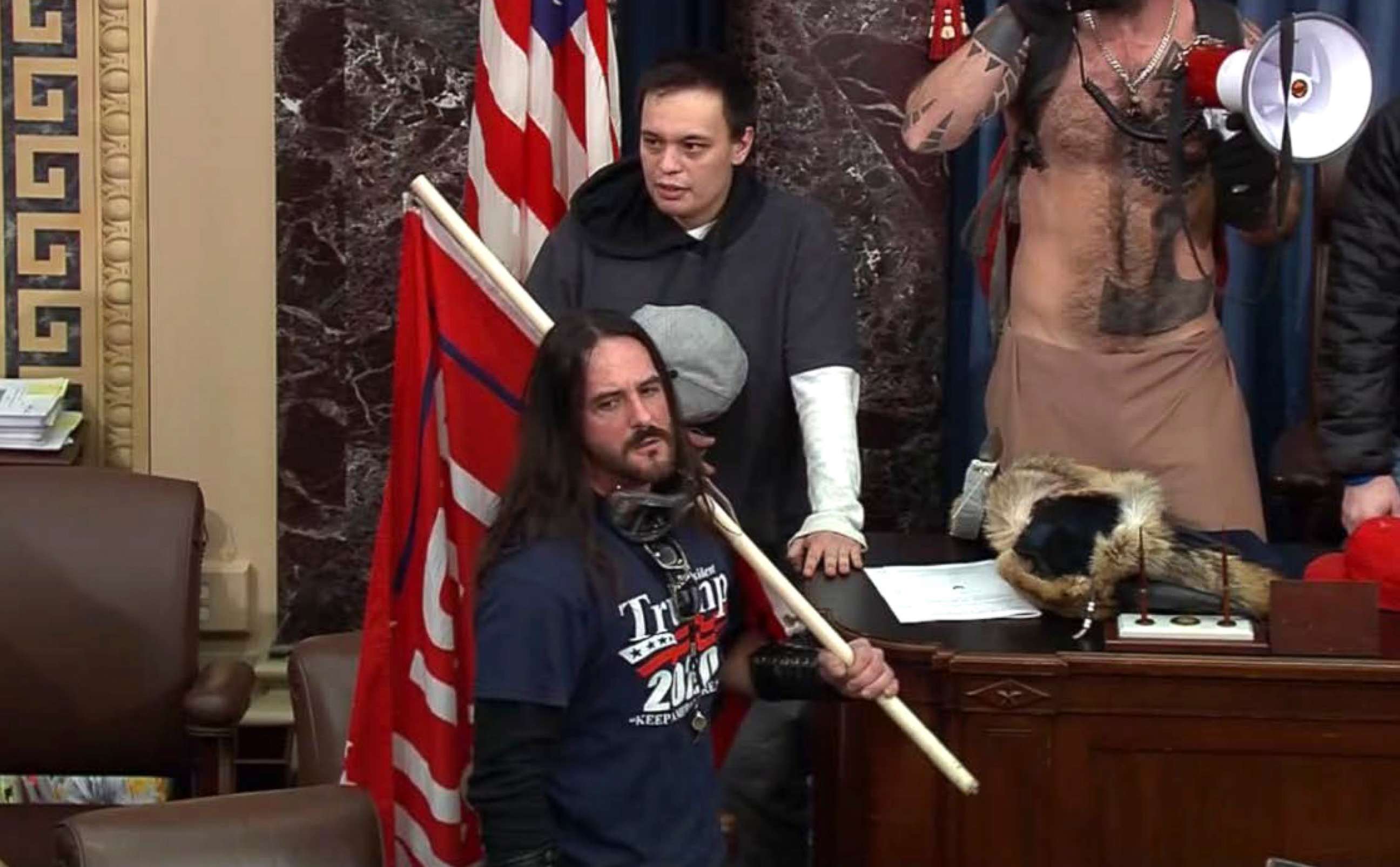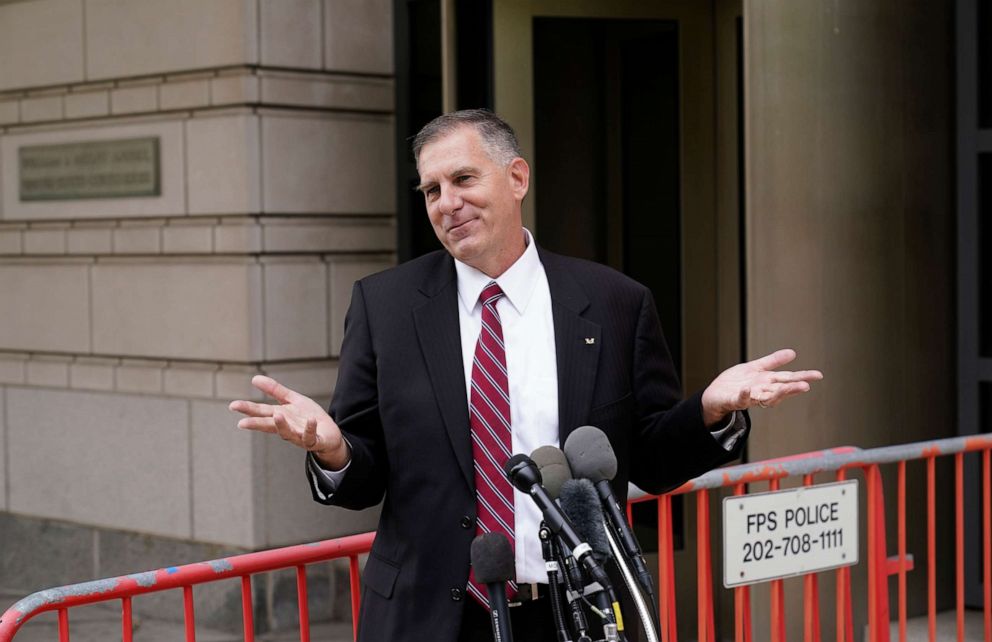Capitol rioter to serve 8 months in prison in 1st felony sentencing from Jan. 6
Paul Hodgkins was seen in videos entering the Senate chamber and taking selfies.
A Florida man who joined in the Jan. 6 assault on the U.S. Capitol will serve eight months in prison with 24 months of supervised release, in the first felony sentencing to result from the Justice Department's sprawling investigation into the insurrection.
Washington, D.C., district judge Randolph Moss said that Paul Hodgkins, 38, who was seen in videos entering the Senate chamber and taking selfies, appeared "prepared for conflict" as he joined the pro-Trump mob in breaching the Capitol in what the judge described as a grave threat to democracy itself.
The Justice Department had asked for Hodgkins to be sentenced to 18 months in prison, while his attorneys had asked that he be released without any prison sentence.
Referring to pictures of Hodgkins holding a red "Trump 2020" flag in the well of the Senate, Moss said it showed "he was staking a claim on the floor of the U.S. Senate, not with an American flag but a flag of a single individual over a nation."
In remarks leading up to handing down his sentence, the judge sought repeatedly to underscore the danger of the Jan. 6 attack and its threat to the country's democratic foundation.

"Jan. 6 means it will be harder for our country and diplomats to convince other nations to pursue democracy, to convince our children that democracy stands as the immutable foundation of this nation; it means that we are now all fearful about the next attack in a way that we never were," Moss said. "It may be the attack on the Capitol was never going to succeed at preventing certification the election, but it did succeed in delaying the democratic process. And that stain will remain on us and on this country for years to come."
Moss sought to make clear that his sentencing was reflective of Hodgkins' actions alone and should not be seen as applying to what other similarly-charged defendants might face with guilty convictions for the felony charge of obstructing Congress' certification of President Joe Biden's election win. Still, the punishment creates a new benchmark for attorneys defending the hundreds of other alleged rioters not charged with violent crimes, who are weighing whether to engage in plea agreements with the government.
Anna Morgan-Lloyd, a 49-year-old hair salon owner, became the first person sentenced in connection with the Jan. 6 attack when she was sentenced on June 23 to three years of probation after pleading guilty to a misdemeanor count of parading, demonstrating, or picketing in a capitol building.
Another rioter, Michael Curzio, was sentenced to six months in jail earlier this month after pleading guilty to a misdemeanor charge. Hodgkins is the first rioter to be sentenced for a more serious felony charge.
Assistant U.S. Attorney Mona Sedky argued during Monday's sentencing hearing that while Hodgkins was not directly accused of participating in any violence during the assault on the Capitol, his actions and advanced preparation for conflict before coming to D.C. that day made him a key player in furthering what she called "an act of domestic terror."
In response, Hodgkins' attorney Patrick Leduc called Sedky's characterization "offensive," saying it was "gaslighting the country, and it needs to stop."

"It was a protest that became a riot," Leduc said, noting that to date no defendants among the more than 540 charged thus far have specifically been charged with terrorism offenses.
Sedky said the government's request that Hodgkins serve 18 months in prison with three years of supervised release -- which represents the mid-range of sentencing guidelines for the felony Hodgkins pleaded guilty to -- should lay down an effective deterrent for any individuals thinking of engaging in similar conduct and disrupting the functions of the government.
"I have a hard time thinking of a crime that, at its core, is more the epitome of disrespecting the law," " Sedky said. "It's truly flouting lawmakers and law enforcement officers who were there to protect them, and the laws that they were trying to enforce to basically transfer power from one president to another president. And so the need to promote respect for the law is really at its pinnacle in a crime like this."
Prior to being sentenced, Hodgkins addressed the court to express regret for his actions, saying that he traveled to D.C. "with the intention of supporting the president I loved." He said went there to participate in a march on Pennsylvania Avenue but never anticipated joining in the storming of Capitol.
"I wish to state that I completely acknowledge and accept that Joseph R. Biden Jr. is rightfully and respectfully the president of the United States," Hodgkins said. "To put things in short, I allowed myself to put passion before my principles, which resulted in me violating the law for the first time in my life -- a thing which I definitely feel shame for, and something that I vow never to let happen again."
Hodgkins pleaded with Judge Moss not to sentence him to time in prison, saying he feared it would mean he would lose his job just before he's set to receive a promotion, and make it difficult for him to find a temporary home for his two cats.
"If there is still a debt that I owe society then I hope that I may be able to pay that debt in a way that affords me the ability to continue to be an otherwise law-abiding, working class and taxpaying citizen, rather than becoming a drain on society," Hodgkins said.
The judge, however, said that Jan. 6 was more than just a simple riot.
"There were people who were swarming into the halls of the Capitol saying, 'Where's Nancy?' The chambers of Congress were emptied during the most solemn act in a democracy of certifying who the next president is going to be by an angry mob," Moss said. "That is not an exercise of First Amendment rights by any measure."




